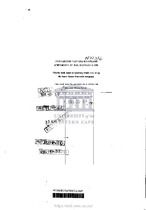| dc.contributor.advisor | Kótze, D. | |
| dc.contributor.author | Wesso, Gilbert R. | |
| dc.date.accessioned | 2021-02-26T10:52:53Z | |
| dc.date.available | 2021-02-26T10:52:53Z | |
| dc.date.issued | 1994 | |
| dc.identifier.uri | http://hdl.handle.net/11394/7907 | |
| dc.description | Philosophiae Doctor - PhD | en_US |
| dc.description.abstract | One of the assumptions of conventional regression analysis is I that the parameters are constant over all observations. It has often been suggested that this may not be a valid assumption to make, particularly if the econometric model is to be used for economic forecasting0 Apart from this it is also found that econometric models, in particular, are used to investigate the underlying interrelationships of the system under consideration in order to understand and to explain relevant phenomena in structural analysis. The pre-requisite of such use of
econometrics is that the regression parameters of the model is assumed to be constant over time or across different crosssectional
units. | en_US |
| dc.language.iso | en | en_US |
| dc.publisher | University of the Western Cape | en_US |
| dc.subject | Econometric model | en_US |
| dc.subject | Regression vector | en_US |
| dc.subject | Model parameters | en_US |
| dc.subject | Linear regression | en_US |
| dc.subject | Coefficients appears | en_US |
| dc.title | The econometrics of structural change: statistical analysis and forecasting in the context of the South African economy | en_US |
| dc.rights.holder | University of the Western Cape | en_US |

